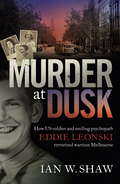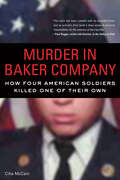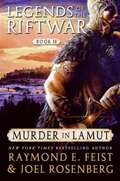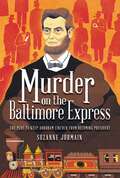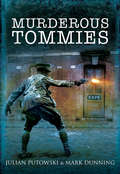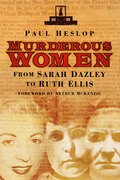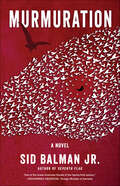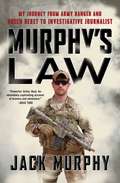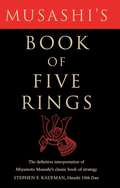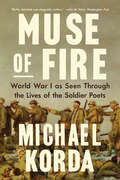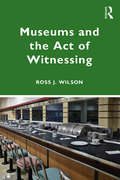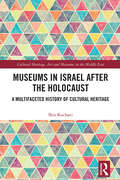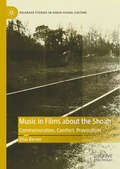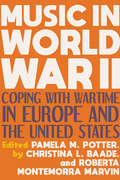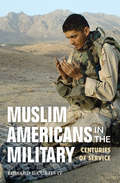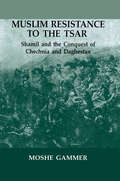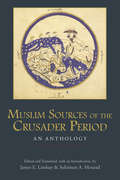- Table View
- List View
Murder Unrenovated (Maggie Ryan #4)
by P. M. CarlsonRealtor Len Trager is anxious to sell the brownstone in Brooklyn’s Park Slope neighborhood, but prospective buyers don’t want to deal with Julia Northrup, who rents the basement apartment. Maggie Ryan and her husband Nick O'Connor love the property. They see though Julia’s act, and they’re not scared off by the corpse on the top floor.
Murder at Dusk: How US soldier and smiling psychopath Eddie Leonski terrorised wartime Melbourne
by Ian W. ShawFar away from any World War II battlefront, the citizens of Melbourne lived in fear of a serial killer - the Brownout Strangler.May 1942: Melbourne was torn between fearing Japanese invasion and revelling in the carnival atmosphere brought by the influx of 15,000 cashed-up American servicemen. But those US forces didn't guarantee safety. Not long after their arrival, the city would be gripped by panic when the body of a woman was found strangled, partially naked and brutally beaten. Six days later another woman was found dead and her body told the same horrific story. A murderer was stalking the streets. As women were warned not to travel alone, an intense manhunt ensued. Not long after a third woman was murdered, American soldier Eddie Leonski was arrested. A calculating psychopath, he had a twisted fascination with female voices, especially when they were singing . . . Acclaimed author Ian W. Shaw brings World War II Melbourne to life, and takes us into the mind of the Brownout Strangler, and a very different kind of terror.'enthralling . . . makes for a fascinating read.' Canberra Times on Ian W. Shaw's The Rag Tag Fleet
Murder at Wrigley Field: A Mickey Rawlings Baseball Mystery (A Mickey Rawlings Mystery #3)
by Troy SoosA historical mystery with &“first-rate wartime Chicago atmosphere&” and starring a ballplayer who &“turns double plays and solves murders with equal grace&” (Publishers Weekly). While the nation wages war against Germany in 1918, utility infielder Mickey Rawlings has been traded to the North Side of Chicago. He's batting a career high (a respectable .274) and the Cubs are in first place. For the first time in a long while Mickey is feeling financially secure enough to buy furniture. That's when his best friend—rookie Willie Kaiser—is shot dead right on the diamond. While the official explanation is "accidental death from a stray bullet," Mickey thinks someone's taken the anti-war sentiment too far. Between collapsing bleacher seats and pretzel sabotage in the stands, Mickey's search for answers takes him from silent movies to speakeasies to the stockyards. As long as he keeps fouling off clues, it's only a matter of time before a killer is caught in a rundown—or Mickey is tagged out permanently. &“[A] quietly effective portrait of wartime Chicago in the throes of painful German-baiting and on the verge of Prohibition.&”—Kirkus ReviewsPraise for the Mickey Rawlings Baseball Mysteries &“Full of life.&”—The New York Times Book Review &“A perfect book for the rain delay…a winner.&” —USA Today &“Delightful…period detail that will leave readers eager for subsequent innings.&”—Publishers Weekly
Murder in Baker Company: How Four American Soldiers Killed One of Their Own
by Cilla McCain"Created with an insightful heart and an activist's drive. Cilla's writing denotes a deep sense of personal responsibility for the veterans of the Iraq War." —Paul Haggis, Writer/Director, In the Valley of Elah, Crash, Quantom of Solace, Million Dollar Baby "Fascinating . . . vividly recounts one of the most tragic true stories to emerge from the Iraq War . . . eloquent, disturbing, and haunting." —Mark Boal, journalist and screenwriter of The Hurt Locker and In the Valley of Elah Upon returning to the United States after surviving one of the Iraq War's bloodiest battles, Army Specialist Richard T. Davis was reported AWOL. But Richard was not AWOL; he was dead. On July 14, 2003, within hours of his return to Fort Benning, he was mercilessly tortured and murdered. Four members of his own platoon were arrested for the crime. In Murder in Baker Company Cilla McCain retraces the events of the case, providing a disturbing, eye-opening look at the problems within today's military. Not only an exploration of a heinous murder, the book is also a warning and a call to action for U.S. citizens.
Murder in LaMut (Legends of the Riftwar #2)
by Raymond E. Feist Joel RosenbergIt should have been so simple . . . Durine, Kethol, and Pirojil are three mercenaries who have spent twenty years fighting other people's battles, defeating the Tsurani and the Bugs and the goblins. Yet now it seems there are no more enemies to vanquish, leaving them with a few months of welcomed garrison duty as the Riftwar rages on in the west. When the trio is ordered to accompany a lady and her husband safely to the city of LaMut, it looks like an easy--even cushy--assignment. But in Midkemia, nothing is that straightforward, and the men find themselves trapped by a vicious winter storm in a castle with scheming lords and ladies, an unsolved murder, and nothing less than the political future of Midkemia at stake. . . .
Murder on the Baltimore Express: The Plot to Keep Abraham Lincoln from Becoming President
by Suzanne Jurmain"A perfect example of excellent narrative nonfiction and a must-have for any middle school library. This work will stand solidly beside books by James Swanson and Steve Sheinkin."--School Library Journal, STARRED REVIEW"Interesting, well-researched, and very well done." --Kirkus Reviews"As Jurmain points out in her thoroughly documented biographical thriller, it was a dangerous ride....The train ride that brought Lincoln home in 1865 has received more attention, but readers may find this one just as memorable."--BooklistFind out how Detective Allan Pinkerton uncovered the plot to murder Lincoln and whisked him safely to Washington D.C. under the darkness of night!While on his inauguration tour, Abraham Lincoln was to travel 2,000 miles by railroad to Washington. D.C. At this time, Confederates were desperate for Lincoln not to take office. Unhappy that Lincoln was against slavery, a group known as the Knights of the Golden Circle devised a plan. In Baltimore, Lincoln would be assassinated. But when Detective Allan Pinkerton learns of the plot, he and his detective agency come up with a plan of their very own. Dive into this incredibly fun and suspenseful true story and learn all about Lincoln's great escape!
Murderous Tommies
by Julian Putkowski Mark DunningMuch has been written about the soldiers executed during WW1 for military offenses, all of whom were conditionally pardoned in 2006. However, until now very little attention has been paid to the cases of men who were tried under the Army Act and executed for murder. The British Army has always been reticent about publicizing courts martial and eighty years elapsed before the government was compelled to prematurely declassify the written proceedings of First World War capital courts martial. Even then, public attention tended to concentrate on cases involving soldiers who had been shot at dawn for offenses other than homicide, and virtually nobody was inclined to seek a posthumous pardon or judicial review for the murderous Tommies. This meant neither the victims nor the convicted mens families were able to discover details about the murder cases. Though readily identifiable online via much-visited war cemetery websites, until now there has been no readily accessible, historically reliable and balanced narrative about the activities and courts-martial of all the murderous Tommies of the Western Front. This book provides for a full account of the cases involving the fourteen soldiers and one officer whose homicidal misdeeds were committed in France and Flanders while hostilities were in progress.Drawing on contemporary records, this carefully researched work chronicles the circumstances in which each of these men either slaughtered one of their comrades or an unarmed civilian. It examines the murderers motives and presents a balanced analysis of each case, including a detailed assessment of the extent to which each condemned man was granted a fair hearing by officers who sat in uneasy judgment as well as those involved in confirming the death sentences.
Murderous Women: From Sarah Dazley to Ruth Ellis
by Paul Heslop Arthur McKenzieSerial poisoners, crimes of passion, brutal slayings and infanticide; this new book examines the stories and subsequent trials behind the most infamous cases of British female killers between the early part of the nineteenth century and the 1950s. Among the cases featured here is that of Sarah Dazley, hanged in 1843 for poisoning her second husband; Mary Ann Cotton, who murdered up to twenty-one people, including many members of her own family; Amelia Dyer, the 'baby farmer' who murdered countless numbers of children; Susan Newell, who murdered her newspaper boy; the execution, in 1923 of Edith Thompson for the murder of her husband, a crime she swore she knew nothing about; and, Ruth Ellis, who gunned down her boyfriend outside the Magdala Tavern in 1955, the last woman to lawfully hang in Britain. Retired police detective Paul Heslop has carefully and objectively analysed each of these prominent British cases. His narrative includes post-trial material as well as the executions of the offenders. Finally, he offers his 'verdict', taking into account all the circumstances so that there are times when justice itself is put on trial.
Murmuration: A Novel
by Sid Balman Jr.Charlie Christmas, Ademar Zarkan, and Prometheus Stone are the best of America—united by war, scarred by displacement, and resolute in the face of the troubles that rip the nation apart over three decades. Christmas, a Somali translator with a split personality, and Zarkan, a Muslim sharpshooter who defies gender and religious constraints to graduate from West Point, are first brought together by Stone, a lapsed Jew and an Army captain, amidst war and famine in East Africa. Their ensuing journey—which takes them from the mean streets of Mogadishu to the high desert of West Texas, from the barren plains of Indian country to the rolling hills of Minnesota—is at turns tragic and uplifting. Charlie’s son, Amir, is the bookmark in their lives, and the struggle to raise him amid the predators of white supremacy and violent radicalism is their life’s work. With the help of Buck, the bomb-sniffing dog with a nose for danger, they prevail over Somali militias, pirates, white supremacists, and ISIS terrorists in a splintering world that has turned on itself like a serpent in the singularly obscene act of devouring its own tail. A sweeping novel that digs deep into the backstories of some of the beloved West Texas characters from Seventh Flag, Balman’s award-winning debut novel, Murmuration is a mesmerizing story of what it means to be American in the twenty-first century.
Murphy's Law: My Journey from Army Ranger and Green Beret to Investigative Journalist
by Jack MurphyFor fans of the New York Times bestsellers The Last Punisher and Lone Survivor, a heart-pounding military memoir from a former Army Ranger sniper and Special Operations weapon sergeant-turned-journalist about the incredible highs and devastating lows of his career. Growing up in small New York towns, Jack Murphy knew he wanted to lead a life far from the ordinary—a life of adventure and valor. After the 9/11 attacks, he immediately enlisted in the Army, knowing this was his chance to live the life he desired and fight for a cause he staunchly supported. After making it through the rigorous Ranger Indoctrination Program, he graduated sniper school and was promptly deployed to Afghanistan, where his experiences went from ordinary to extraordinary. In this gripping military memoir, Murphy recounts the multiple missions he underwent as a Ranger, a Special Forces weapons sergeant, and ultimately, a boots-on-the-ground journalist. From enemy ambushes, dodging explosives, crashing terrorists’ weddings, and landing helicopters in the streets of Mosul, Jack provides a hard-hitting glimpse of what combat is like in some of the world’s most dangerous, war-torn places. With tours of duty in two of the most decorated units of the armed forces, Murphy brings a unique perspective to the military genre as he reflects on his great triumphs and shattering failures both on and off the battlefield. Later, Murphy turned his attention to breaking news within the military. His stories have taken him from Iraq to Switzerland, from Syria to South Korea. From crossing Middle Eastern borders in the dead of night, to rolling into an IED-laden zone, Murphy’s stories are always a thrill a minute. Murphy’s Law tells a story of intense bravery and sacrifice—both on and off the battlefield.
Musashi's Book of Five Rings
by Stephen F. KaufmanOften used to explain Japanese business competition, Musashi's Book of Five Rings is more properly a definitive treatise on mortal combat from one of Japan's most formidable warriors - the martial arts luminary Miyamoto Musashi. Famed martial artist Stephen Kaufman has translated this classic without the usual commercial bias, driving straight to the heart of Musashi's incisive martial arts stratagems. The result is an enthralling combination of powerful technical wisdom and the philosophical elucidation offered to martial artists by Buddhism, Shintoism, Confucianism, and Taoism. From the metaphor of the Four Elements and fundamentals of physical practice and strategy to an offering of Zen wisdom on the "way" of nature, Musashi's Book of Five Rings is as profound and important a book on martial arts as you will find.
Musashi's Book of Five Rings
by Stephen F. KaufmanMiyamoto Musashi is the greatest martial artist and warrior Japan has ever known. His Book of Five Rings is the definitive Japanese treatise on warfare, mortal combat and the chivalrous code of the samurai known simply as Bushido--the "Way of the Warrior." This classic book by Stephen Kaufman is a modern interpretation of Musashi's work specifically intended for today's martial artist. It explains the essential truths found in the Book of Five Rings that are necessary for a full understanding of Musashi's message as it was originally intended--as a practical training manual for warriors. The result is an enthralling treatise on martial strategy combining a warrior's instincts with the deep philosophical insights of Buddhism, Shintoism, Confucianism and Taoism. It is a book that every modern warrior should read and absorb.
Musashi's Book of Five Rings
by Stephen F. KaufmanThis classic work interprets Miyamoto Musashi's famous Book of Five Rings specifically for the martial artist-as Miyamoto Musashi originally intended. It explains the underlying truths necessary for a full understanding of Musashi's message for warriors. The result is an enthralling book on martial strategy that combines the instincts of the warrior with the philosophies of Zen Buddhism, Shintoism, Confucianism and Taoism. It is a crucial book for every martial artist to read and understand. Like the original, this book is divided into five sections. The Book of Earth lays the groundwork for anyone wishing to understand Musashi's teachings; the Book of Water explains the warrior's approach to strategy; the Book of Fire teaches fundamental fighting techniques based on the Earth and Water principles; the Book of Wind describes differences between Musashi's own martial style and the styles of other fighting schools; while the Book of No-thing describes the "way of nature" as understood through an "unthinking" existing preconception.Famed martial artist Stephen Kaufman has translated this classic without the usual academic or commercial bias, driving straight into the heart of Musashi's martial teachings and interpreting them for his fellow martial artists.
Muse of Fire: World War I as Seen Through the Lives of the Soldier Poets
by Michael KordaThe First World War comes to harrowing life through the intertwined lives of the soldier poets in Michael Korda’s epic Muse of Fire. Michael Korda, the best-selling author of Hero and Alone, tells the story of the First World War not in any conventional way but through the intertwined lives of the soldier poets who came to describe it best, and indeed to symbolize the war’s tragic arc and lethal fury. His epic narrative begins with Rupert Brooke, “the handsomest young man in England” and perhaps its most famous young poet in the halcyon days of the Edwardian Age, and ends five years later with Wilfred Owen, killed in action at twenty-five, only one week before the armistice. With bitter irony, Owen’s mother received the telegram informing her of his death on November 11, just as church bells tolled to celebrate the war’s end. Korda’s dramatic account, which includes anecdotes from his own family history, not only brings to life the soldier poets but paints an unforgettable picture of life and death in the trenches, and the sacrifice of an entire generation. His cast of characters includes the young American poet Alan Seeger, who was killed in action as a private in the French Foreign Legion; Isaac Rosenberg, whose parents had fled czarist anti-Semitic persecution and who was killed in action at the age of twenty-eight before his fame as a poet and a painter was recognized; Robert Graves and Siegfried Sassoon, whose friendship and friendly rivalry endured through long, complicated private lives; and, finally, Owen, whose fame came only posthumously and whose poetry remains some of the most savage and heartbreaking to emerge from the cataclysmic war. As Korda demonstrates, the poets of the First World War were soldiers, heroes, martyrs, victims, their lives and loves endlessly fascinating—that of Rupert Brooke alone reads like a novel, with his journey to Polynesia in pursuit of a life like Gauguin’s and some of his finest poetry written only a year before his tragic death. Muse of Fire is at once a portrait of their lives and a narrative of a civilization destroying itself, among the rubble, shadows, and the unresolved problems of which we still live, from the revival of brutal trench warfare in Ukraine and in the Middle East.
Museums and the Act of Witnessing
by Ross J. WilsonMuseums and the Act of Witnessing examines how representations of traumatic histories and the legacies of the twentieth century in museums and heritage sites across the world shape political, social and cultural identities. Drawing on an interdisciplinary analysis of a variety of museum exhibitions around the globe, the book demonstrates how the narrative of ‘witnessing’ has shaped representation of war, genocide, repression and violence. Revealing that this form of presentation is inherently Western in its origins and nature, Wilson goes on to argue that witnessing the past is to colonise the future, as we project a certain view of the events of the past onto the present. Detailing the character, content and meanings of representation that focus on the traumatic events of the twentieth century, the book demonstrates the way in which visitors are cast as ‘witnesses’ and questions what the true purpose of witnessing really is. Museums and the Act of Witnessing draws attention to the fact that we have inherited a distinct, and often limited, mode of seeing the past and considers how we can more effectively engage with the past in the present. The book will be of interest to academics and students engaged in the study of museums, history, sociology, conflict, politics and memory.
Museums in Israel after the Holocaust: A Multifaceted History of Cultural Heritage (Cultural Heritage, Art and Museums in the Middle East)
by Shir Gal KochaviMuseums in Israel After the Holocaust explores the influence of the traumatic events of the Holocaust on the formation of a cultural heritage policy during the foundational years of the State of Israel.Based on primary research, the book offers a new understanding of cultural practices after the Second World War, while analyzing the role of key Jewish cultural representatives who shaped museum collections that emerged during this period. The book investigates the ways Israel has dealt with the complicated history of “heirless” Jewish cultural objects and questions of ownership, by providing a detailed examination of the process of allocation of “heirless” Jewish cultural property handled by two American-Jewish organizations: the Jewish Restitution Successor Organization (JRSO) and the Jewish Cultural Reconstruction (JCR) in the immediate years following the Second World War. The book takes a material culture approach, which explores the meanings and values attached to an object over the course of time and during its transition between different owners.Museums in Israel After the Holocaust is essential reading for academics, students, and professionals working on and interested in Holocaust and Israel studies, art history, material culture studies, museum studies, cultural heritage, and Middle Eastern studies.
Museums, History and the Intimate Experience of the Great War: Love and Sorrow (Routledge Studies in First World War History)
by Joy Damousi Bart Ziino Deborah Tout-SmithThe Great War of 1914-1918 was fought on the battlefield, on the sea and in the air, and in the heart. Museums Victoria’s exhibition World War I: Love and Sorrow exposed not just the nature of that war, but its depth and duration in personal and familial lives. Hailed by eminent scholar Jay Winter as "one of the best which the centenary of the Great War has occasioned", the exhibition delved into the war’s continuing emotional claims on descendants and on those who encounter the war through museums today. Contributors to this volume, drawn largely from the exhibition’s curators and advisory panel, grapple with the complexities of recovering and presenting difficult histories of the war. In eleven essays the book presents a new, more sensitive and nuanced narrative of the Great War, in which families and individuals take centre stage. Together they uncover private reckonings with the costs of that experience, not only in the years immediately after the war, but in the century since.
Music for Love or War
by Martyn Burke"Music for Love or War is slash-and-burn funny, but also unexpectedly touching and wise. Few writers can take you in one breath from the hills of Afghanistan to the gates of the Playboy Mansion and make you believe every crazy word. Martyn Burke has that special talent." --Carl Hiaasen, author of the New York Times bestselling novel Bad MonkeyAccording to what we've been told, the source of all knowledge is somewhere just south of Sunset Boulevard. The problem is that Danny has lost the address. So begins Martyn Burke's tragi-comic novel of love and war. Danny, a Canadian sharpshooter, and Hank, in the U.S. Army, have been stationed in Kandahar, but they are in Los Angeles, desperate to find the Hollywood psychic who will reveal the whereabouts of the women they love. Danny is searching for Ariana, the girl he fell in love with in Toronto in the last years of the twentieth century; Hank is searching for Annie Boudreau, known in the tabloids as "Annie of the Boo Two"--twins who were briefly in the gravitational pull of Hugh Hefner. From Grenadier Pond in west-end Toronto, to Afghanistan, to the Malibu colony in LA, the novel follows these moments in the lives of Danny and Hank, revealed by a masterful storyteller and commentator on American culture. When in the mountains of Kandahar, Danny and Hank torture the members of al Qaeda and the Taliban with the music and a larger-than-life-size cardboard reproduction of Liberace in satin short shorts, high-kicking as if on Broadway.
Music in Films about the Shoah: Commemoration, Comfort, Provocation (Palgrave Studies in Audio-Visual Culture)
by Elias BernerThis book focuses on the aural and musical sphere of fictional audio-visual reconstructions of the Holocaust, a defining event in the history of the 20th century. Musicology has seen an increasing number of works on the function of film music and the construction of identity in media contexts in recent years. This project analyses the use of music in feature films about the Shoah. The analysis of 'the sound of Nazi violence', as well as the escape from and resistance against it, not only reveals a lot about the construction of the filmic characters' emotive states, but also tells us more about our own relationship to the past. The author understands the soundtrack of these films as an affective mediator of time, which connects filmic representations of the past with the present. Analysis focuses on the soundtracks of four films: Schindler's List, The Pianist, Taking Sides and Inglourious Basterds.
Music in World War II: Coping with Wartime in Europe and the United States
by Pamela M. Potter, Christina L. Baade, and Roberta Montemorra MarvinA collection of essays examining the roles played by music in American and European society during the Second World War.Global conflicts of the twentieth century fundamentally transformed not only national boundaries, power relations, and global economies, but also the arts and culture of every nation involved. An important, unacknowledged aspect of these conflicts is that they have unique musical soundtracks. Music in World War II explores how music and sound took on radically different dimensions in the United States and Europe before, during, and after World War II. Additionally, the collection examines the impact of radio and film as the disseminators of the war’s musical soundtrack. Contributors contend that the European and American soundtrack of World War II was largely one of escapism rather than the lofty, solemn, heroic, and celebratory mode of “war music” in the past. Furthermore, they explore the variety of experiences of populations forced from their homes and interned in civilian and POW camps in Europe and the United States, examining how music in these environments played a crucial role in maintaining ties to an idealized “home” and constructing politicized notions of national and ethnic identity. This fascinating, well-constructed volume of essays builds understanding of the role and importance of music during periods of conflict and highlights the unique aspects of music during World War II.“A collection that offers deeply informed, interdisciplinary, and original views on a myriad of musical practices in Europe, Great Britain, and the United States during the period.” —Gayle Magee, co-editor of Over Here, Over There: Transatlantic Conversations on the Music of World War I
Music in the 20th Century (3 Vol Set)
by Dave DiMartinoThis is an examination of the crucial formative period of Chinese attitudes toward nuclear weapons, the immediate post-Hiroshima/Nagasaki period and the Korean War. It also provides an account of US actions and attitudes during this period and China's response.
Muskets and Applejack: Spirits, Soldiers, and the Civil War
by Mark Will-Weber"I wish some of you would tell me the brand of whiskey that Grant drinks. I would like to send a barrel of it to my other generals."- President Abraham Lincoln, when confronted about General Ulysses Grant's excessive drinking.Blood, gunfire, and whiskey: they are the three things that defined Civil War battlefields. In this fascinating, booze-drenched history of the war that almost tore America apart, historian Mark Will-Weber (author of Mint Juleps with Teddy Roosevelt) weaves together lighthearted stories of drunken generals and out-of-control soldiers with the gritty reality of battlefields where whiskey was the only medicine-and sometimes the only food.Muskets and Applejack paints a full, complex picture of the surprisingly large role alcohol played in the Civil War: how it helped heal physical and emotional wounds, form friendships, and cause strife. Interspersed between stories from the battlefield are authentic recipes of soldiers' favorite drinks-from both sides of the Mason-Dixon line.
Muslim Americans in the Military: Centuries of Service (Encounters: Explorations in Folklore and Ethnomusicology)
by Edward E. Curtis IVStories of Muslims who have served, dating back to the Revolutionary War. Since the Revolutionary War, Muslim Americans have served in the United States military, risking their lives to defend a country that increasingly looks at them with suspicion and fear. In Muslim Americans in the Military: Centuries of Service, Edward E. Curtis illuminates the long history of Muslim service members who have defended their country and struggled to practice their faith. With profiles of soldiers, marines, airmen, and sailors since the dawn of our country, Curtis showcases the real stories of Muslim Americans, from Omer Otmen, who fought fiercely against German forces during World War I, to Captain Humayun Khan, who gave his life in Iraq in 2004. These true stories contradict the narratives of hate and fear that have dominated recent headlines, revealing the contributions and sacrifices that these soldiers have made to the United States.
Muslim Resistance to the Tsar: Shamil and the Conquest of Chechnia and Daghestan
by Moshe GammerFirst published in 2003. Routledge is an imprint of Taylor & Francis, an informa company.
Muslim Sources of the Crusader Period: An Anthology
by James E. Lindsay Suleiman Ali MouradDrawn from greater Syria, northern Mesopotamia, and Egypt, the sources in this anthology—many of which are translated into English for the first time here--provide eyewitness and contemporary historical accounts of what unfolded in the eastern Mediterranean and the Near East between the eleventh and fourteenth centuries. In providing representative examples of the many disparate types of Muslim sources, this volume opens a window onto life in the Islamic Near East during the Crusader period and the interactions between Franks and Muslims in the broader context of Islamic history. Ideally suited for use in undergraduate courses on the Crusades or the pre-modern Islamic Near East, this anthology will also appeal to any readers seeking a better understanding of the Islamic response to the Crusades and the general history of the Near East in this period.

